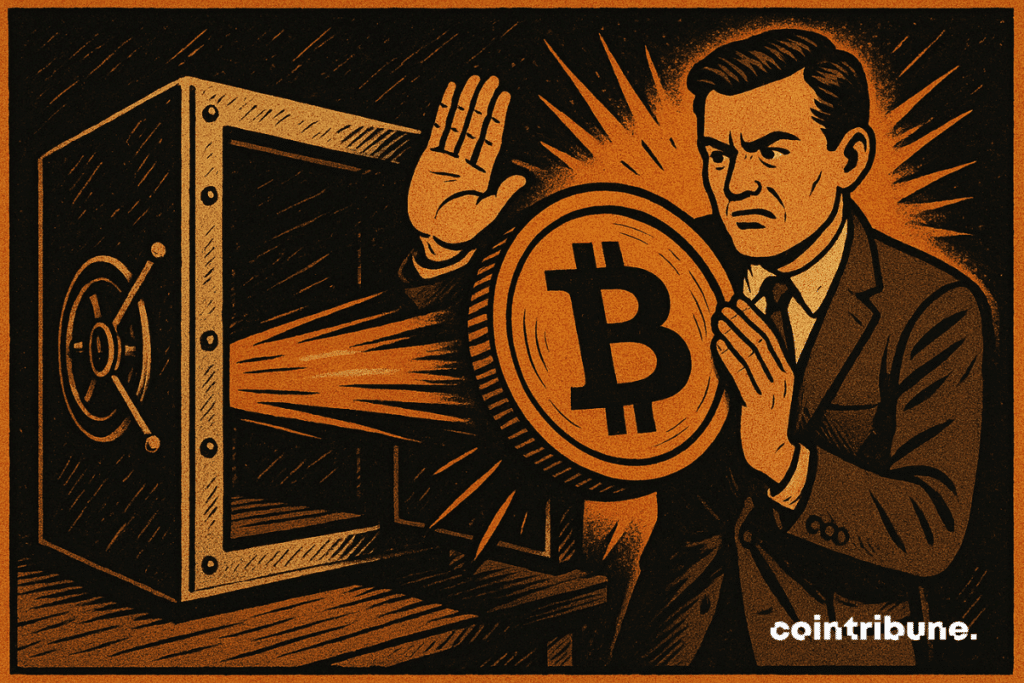Swiss National Bank Rules Out Bitcoin In Its Reserves
While cryptocurrencies are disrupting the global monetary order and pushing states and central banks to rethink their strategies, Switzerland chooses the path of caution. The Swiss National Bank (SNB), guardian of the country’s economic stability, has firmly rejected the idea of integrating bitcoin into its reserves. This clear stance comes at a time when a citizen initiative is trying to force the adoption of crypto at the highest institutional level.

In Brief
- The Swiss National Bank (SNB) reaffirms its refusal to include bitcoin among its official reserves, despite the global rise of cryptos.
- President Martin Schlegel justifies this rejection by citing bitcoin’s high volatility and lack of liquidity, incompatible with SNB’s stability requirements.
- A citizen initiative led by pro-bitcoin activists aims to amend the Swiss Constitution to impose bitcoin integration into national reserves.
- The debate raises questions about the future of cryptos in central banks’ strategies and the balance between direct democracy and monetary independence.
Stability Above All: Why Does the SNB Refuse to Integrate Bitcoin?
During the annual general meeting held in Bern on Friday, April 25, 2025, Martin Schlegel, President of the Swiss National Bank (SNB), categorically rejected the idea of including bitcoin among reserve assets.
He stated before shareholders:
Crypto currently cannot meet the requirements for our monetary reserves.
Schlegel emphasized that SNB assets must meet strict criteria, including high market liquidity and value stability—qualities bitcoin is currently unable to provide in its current state of development.
By adhering to these criteria, the SNB aims to guarantee the rapid availability of its resources, essential for market interventions or supporting the Swiss franc during periods of volatility.
Specifically, the SNB identifies several weaknesses that exclude bitcoin from its reserve options:
- Lack of sufficient liquidity: bitcoin trading volumes are considered too low to ensure quick sales without major price impact
- Extreme volatility: bitcoin’s significant fluctuations do not allow for reliable preservation of reserve value
- Strategic inadequacy: the SNB must have assets mobilizable without delay in crisis situations, a condition difficult to fulfill with cryptos.
By maintaining this policy, the Swiss central bank asserts its top priority: preserving the stability and resilience of the national financial system, even in the face of new global economic dynamics.
A Pro-Bitcoin Referendum Shaking the Institutional Status Quo
Opposite to the SNB’s caution, a citizen initiative seeks to shake the legal foundations of national reserve management. Led by Luzius Meisser, an entrepreneur and ardent bitcoin supporter, a movement aims to force the Swiss National Bank to diversify its assets by integrating bitcoin alongside gold.
Additionally, according to Meisser, “bitcoin represents a special asset in a multipolar world where trust in public debts is gradually collapsing.” This initiative intends to organize a national referendum to amend the Constitution, thus giving a political dimension to this economic debate.
The Swiss legislative process, based on direct democracy, allows citizens to propose such constitutional amendments, provided they gather a sufficient number of signatures. If the initiative reaches this threshold, a national vote could then compel the SNB to review its asset management principles.
This prospect raises questions about a central bank’s ability to maintain its neutrality and operational flexibility while responding to specific popular demands.
If the bitcoin campaign managed to mobilize a significant portion of the Swiss population, it could create an unprecedented precedent in the history of modern central banks. However, even in case of success, the road would be long before effective implementation, considering the necessary legal, regulatory, and technical adjustments. In a world where trust in traditional currencies is wavering, the debate around bitcoin in sovereign reserves could mark a fundamental evolution of central banks’ role vis-à-vis cryptos.
Maximize your Cointribune experience with our "Read to Earn" program! For every article you read, earn points and access exclusive rewards. Sign up now and start earning benefits.
Diplômé de Sciences Po Toulouse et titulaire d'une certification consultant blockchain délivrée par Alyra, j'ai rejoint l'aventure Cointribune en 2019. Convaincu du potentiel de la blockchain pour transformer de nombreux secteurs de l'économie, j'ai pris l'engagement de sensibiliser et d'informer le grand public sur cet écosystème en constante évolution. Mon objectif est de permettre à chacun de mieux comprendre la blockchain et de saisir les opportunités qu'elle offre. Je m'efforce chaque jour de fournir une analyse objective de l'actualité, de décrypter les tendances du marché, de relayer les dernières innovations technologiques et de mettre en perspective les enjeux économiques et sociétaux de cette révolution en marche.
The views, thoughts, and opinions expressed in this article belong solely to the author, and should not be taken as investment advice. Do your own research before taking any investment decisions.